|
Nov 1, 1896
|
Born at Orange,
New Jersey, USA
On the June 7, 1900 USA Census, his birth date was given as November
1897. The 1896 date is taken from his
Attestation Papers and on his WW2 Draft Registration Card that he filed.
|
|
Oct 16, 1917
|
Attested into
the Railway Construction & Forestry Depot at Brockville Ontario
Ø Number 2161232
Ø Next of kin given as Edward P Jones (father) of 8 Whittlesey Ave, East
Orange New Jersey, USA
Ø Previous occupation given as Clerk
Ø No previous military experience given
Ø Religion given as Church of England
It is noted
that “Not finally approved for RFC, Varicose veins”.
|
|
Nov 27, 1917
|
Embarked the RMS
Metagama at Halifax Nova Scotia as part of the 5th Draft, Canadian Forestry
Corps
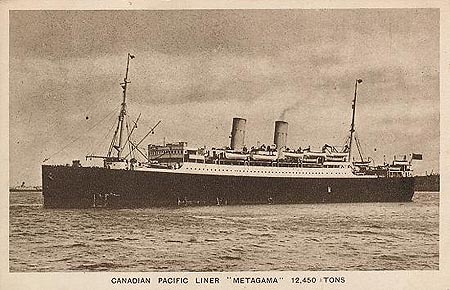
|
|
Dec 14, 1917
|
Disembarked at
Liverpool England and proceeded to the CFCD (Canadian Forestry Corps Depot) at Sunningdale
and assigned to #2 Company
|
|
Dec 24, 1917
|
He wrote a
letter to his girlfriend, Margaretta Campfield, in Newark New Jersey, on Christmas Eve. Part of that letter reads:
“Christmas
Eve – 5000 miles from home – nothing but a dirty, thick army sock to hang up
– no Christmas tree – strange girls – hell of a world isn’t it”
|
|
Jan 13, 1918
|
In a letter to
his girlfriend he writes in part:
“I hope to have another chance
at the Flying Corps soon but don’t tell Mother as she’ll only worry until they
have either accepted or refused me. Perhaps
if I fail that, I shall transfer to the infantry provided my varicose veins won’t
exclude me.”
|
|
Feb 14, 1918
|
In a letter
written to his girlfriend he writes in part:
“Well I
haven’t much news to impart except that if I don’t soon get out of this camp
I’m going on a rip roarin drunk or something similar.
Really, I’m fed up with it. Have
tried for a month to transfer to infantry and here I am, still in the “Sawdust
Fusiliers”.
|
|
Mar 3, 1918
|
In a letter to
his girlfriend he writes in part:
“Well so
its mine for the infantry. I was one of 19
volunteers last Friday and we are leaving the “Sawdust Fusiliers” for the 8th
Canadian Reserves tomorrow. I’m going to
have a good stiff time ahead of me as the training is very intensive and I am somewhat
doubtful whether I’ll be able to stand it.”
|
|
Mar 17, 1918
|
In a letter to
his girlfriend he writes in part:
“Your comments on the
“Slackers” and “Draft Dodgers” at home are just about right. But in the long run, they’ll be the only ones
to suffer, so I wouldn’t get so worked up about it.”
|
|
Apr 6, 1918
|
Transferred to
the 6th Reserve Battalion at Seaford and assigned to “H” Company
|
|
Apr 26, 1918
|
In a letter to
his girlfriend he writes in part:
“We are terribly busy here and
it is a cinch that we’ll be “over there” before many moons. Honestly Margaretta this is the first opportunity
I’ve had to write in ten days – not even a letter to Mother until tonight. We are on the go from 5.30 am till 9.00 pm and by
that time I’m ready to turn in, I’ll tell you.”
|
|
Apr 29, 1918
|
In a letter to
his girlfriend he writes in part:
“I
can’t write anymore tonight Margaretta, as I am stealing time from my “cleaning
up” to send this little note and unless I want to get cb’d – “confined
to barracks” for a week or so, I must get on the job and shine up.”
|
|
May 14, 1918
|
In a letter to
his girlfriend he writes in part:
“Jakaloo! Yes, that long delayed package arrived today, in
good shape, and everything was there – kit, flashlight, cold cream, cigarettes,
newsline, Anolas thread, everything. Needless
to say the crackers were seized upon by all hands and the entire box was polished off in
no time. You see, it’s part of the
comradeship in the army to share everything in the line of eats with your mates. So for that part of the package, there are about
six of us indebted to you.”
|
|
May 19, 1918
|
In a letter to
his girlfriend he writes in part:
“I’ve had occasion to
think very nicely of you these past few days as I smashed two fingers a bit making a jab
with a bayonet at a bundle of faggots (dummies used for bayonet
practice) and missing and your adhesive tape was just
the jake proposition. And the scissors cut
the tape and some skin and the smokes helped too. I
use that little kit very very often and believe me the whole box was jake-a-bon.”
|
|
Jun 10, 1918
|
In a letter to
his girlfriend he writes in part:
“About your doing war work
– if you possibly could become a nurse Margaretta, do it. It’s the most wonderful calling in the war
and believe me, after our nurses, we men come a poor second. You’d probably be able to satisfy all your
hankering for adventures etc at the nursing game and gee – I know you’d make a
dandy nurse.”
|
|
Jun 30, 1918
|
In a letter to
his girlfriend he writes in part:
“Yes I
did write George (brother) asking him to enlist with the Americans of course. I do hope my letter will have some affect as there
isn’t a thing in the world to prevent his joining up.
If he can’t get in our army, well then its up to him whether he cares to join
the Canadians. Believe me Margaretta
there’s going to be a distinction between the fellows that went and the ones that
stayed home and I don’t want my brother to be on the wrong side of the fence.”
|
|
Jul 30, 1918
|
In a letter to
his girlfriend he writes in part:
“We’re already for draft
now but there are no indications of our leaving in the near future. I do hope we go across soon as I’m rather fed
up here especially as another leave is six months distant.
Enjoyed my second leave heaps
I’ll tell you. I can’t write about
it so I’ll just have to save it along with heaps of other things to tell you
personally.”
|
|
Aug 17, 1918
|
Transferred to
21st Battalion
|
|
Aug 18, 1918
|
Arrived at CIBD
(Canadian Infantry Base Depot) at Havre and TOS (Taken On Strength) the 21st
Battalion
|
|
Aug 23, 1918
|
Arrived at CC
Rein C (Canadian Corps Reinforcement Camp)
|
|
Aug 25, 1918
|
In a letter to
his girlfriend he writes in part:
“We’ve
sort of been on a constant move since leaving Blighty and at present we’re at the 2nd
Divisional Wing, Canadian Corps Reinforcement Camp, British Exp Forces, France. Mighty definite that, isn’t it?
……….Speaking
of places to sleep, I do wish you could see our chateau.
One of those old French mud and straw barns, minus most of the sides and roof but
not withstanding that, a very comfortable home considering.
The floor was fairly well studded with stones but we dug those up and now have nice
soft comfortable dirt on which to rest our carcasses.
The French
woman living in the house to which our barn is attached calls me “Slam”. I guess that’s French for Slim.”
It appears that the nickname “Slim” stuck with him when he
joined the 21st Battalion, however he did sign his Christmas Card in 1918 as
“Skinnie Jones”. On April 6, 1919,
his medical report records him as being 6’1” and weighing in at 116 lbs.
|
|
Aug 28, 1918
|
Joined the 21st
Battalion in the field and assigned to “B” Company
On this date, the 21st Battalion was involved in heavy
fighting at Telegraph Hill, so Pte Jones joined the rear details at Achicourt and would
have waited there for the Battalion to come out of the front lines.
From the book “Ordinary
Heroes” by Stephen J Nichol, he was employed as both a Scout and an Interpreter.
|
|
Sep 7, 1918
|
In a letter to
his girlfriend he writes in part:
“Have
seen some strange sights in this country. These
ruined towns, dead Fritzes, smelly dugouts etc, are enough to give one the creeps. Guess I’ll get accustomed to it though,
after ten years or so over here.”
|
|
Oct 21, 1918
|
In a letter to
his girlfriend he writes in part:
“Could we get a piano to play
those songs on? I’ll say so and we have
a chap in the scouts that can play some more ragtime.
It’s funny to hear the piano thumping away in some old tumble down house, all
wrecked from shell fire.”
|
|
Nov 14, 1918
|
In a letter to
his girlfriend he writes in part:
“As you see, we are in Belgium
now having fought our way out of France. The
past week has been just a succession of triumphant marches as the opposition was
practically nil. I can’t describe the
scenes of those days Margaretta but can you imagine how you’d feel after being really
a prisoner for four years and then to wake up one morning and watch the troops that made
you free again march thru your village. Would
you cry, weep, dance for joy? Well they did
everything they could do. Gee it sure was a
wonderful week.”
|
|
Nov 20, 1918 Posted
a Xmas Card home
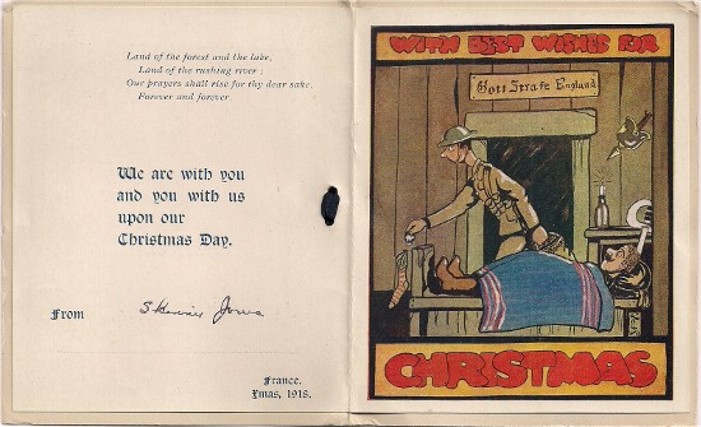
|
|
Feb 16, 1919
|
In a letter to
his girlfriend he writes in part:
“No I don’t think Germany
will cause any more trouble other than a heap of internal strife which is really the
natural conclusion to such an upheaval as the German nation has had.
Say Margaretta I want you to
promise to have all the latest pieces at home won’t you and have all the new dances
tucked away to teach me.”
|
|
Mar 28, 1919
|
In a letter to
his girlfriend he writes in part:
“And so you were thinking of
taking an apartment and would have asked me to dinner.
Thanks awfully – sort of unconventional I know but I like that sort of thing
more or less, fact of the matter is I might have insisted on staying overnight – now
I ask you – what would you have done I ask you?
Margaretta, if you haven’t
already done so you must read that book “The Garden Without Walls” by Coningsby
Dawson. You’ll pardon me for suggesting
it I hope – its perfectly alright you know and so well written. I haven’t suggested everyone reading it
though, fact is you are the only young lady of my acquaintance to whom I have dared to
suggest such thing. So don’t condemn me
too severely when you’ve read, will you?”
Researcher’s
note: this book is available as a free
download from the Internet Archive
|
|
Apr 3, 1919
|
Embarked the
Western Australia at Havre
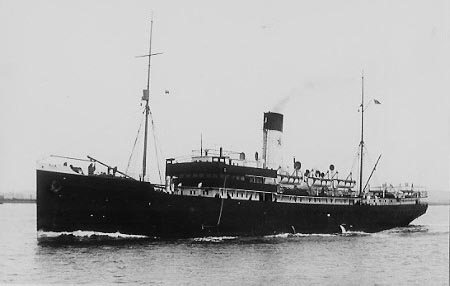
Disembarked
in England and proceeded to Witley
|
|
Apr 4, 1919
|
TOS
“P” Wing CCC (Canadian Concentration Camp) Witley, for processing pending return
to Canada
|
|
May 13, 1919
|
Embarked the RMS
Caronia at Liverpool
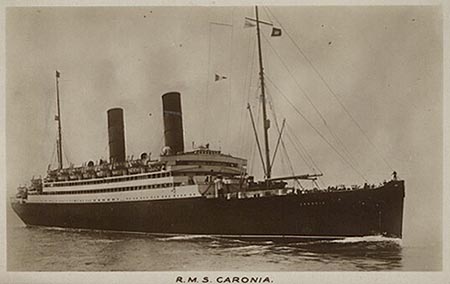
|
|
May 23, 1919
|
Disembarked at
Halifax Nova Scotia and proceeded by train to Kingston Ontario
|
|
May 24, 1919
|
Discharged from
the CEF at Kingston Ontario
Ø War Service Badge Class “A” issued, number 279829
Ø Proposed residence on discharge – 8 Whittlesey Ave, East Orange
New Jersey, USA
|
|
Oct 9, 1922
|
The British War
Medal and Victory Medal were sent to him at 138 South Munn Ave, East Orange New Jersey,
USA
|
|
In 1941 he registered for the United
States draft for WW2 as a transient, living in New York City and employed by The Texas
Company at 2806 Chrysler Bldg, New York City
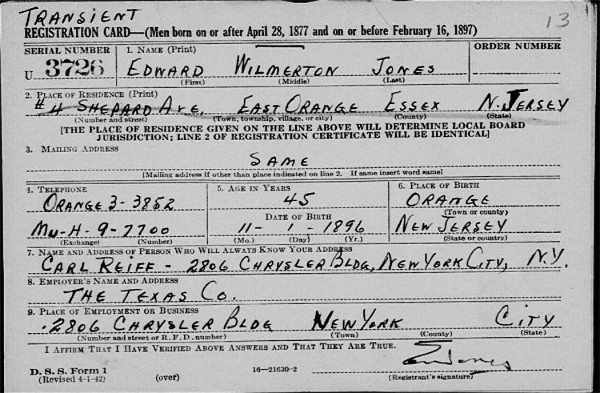
He is reported as having died at Patterson NY while enroute to Canada
in November of 1959
The letters
that are quoted above are held in the Princess of Wales' Own Regiment Museum in Kingston Ontario
|
|